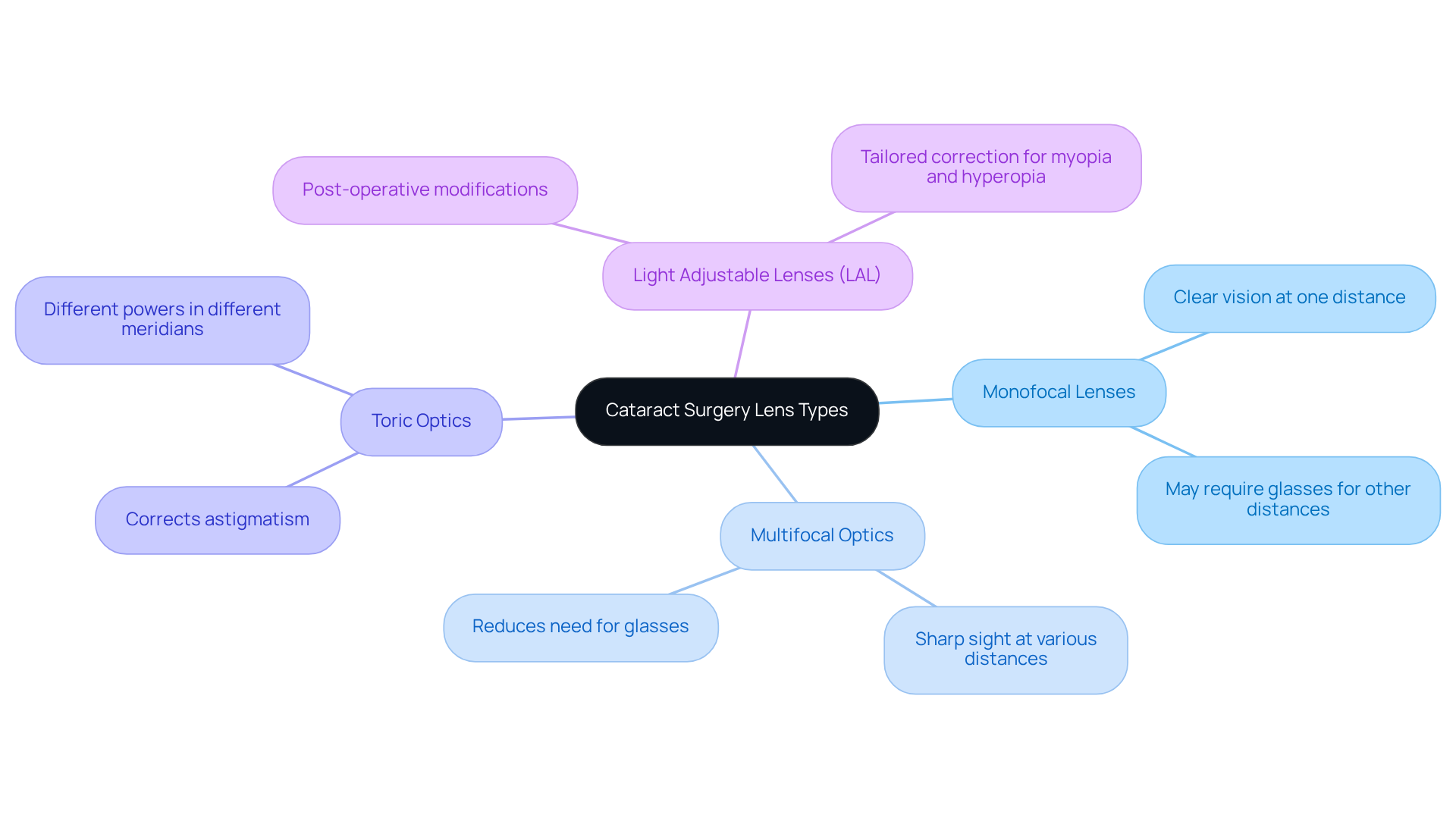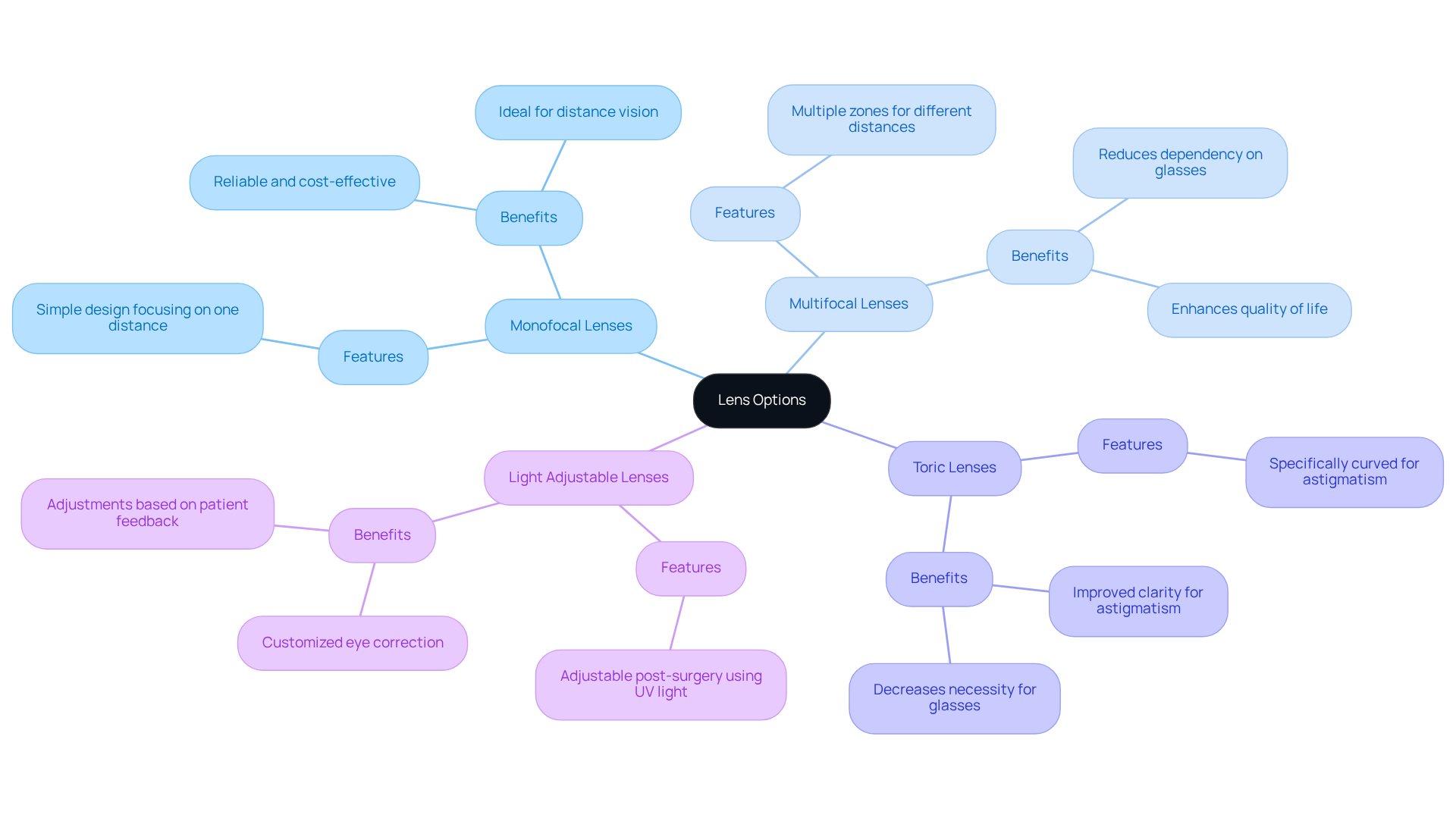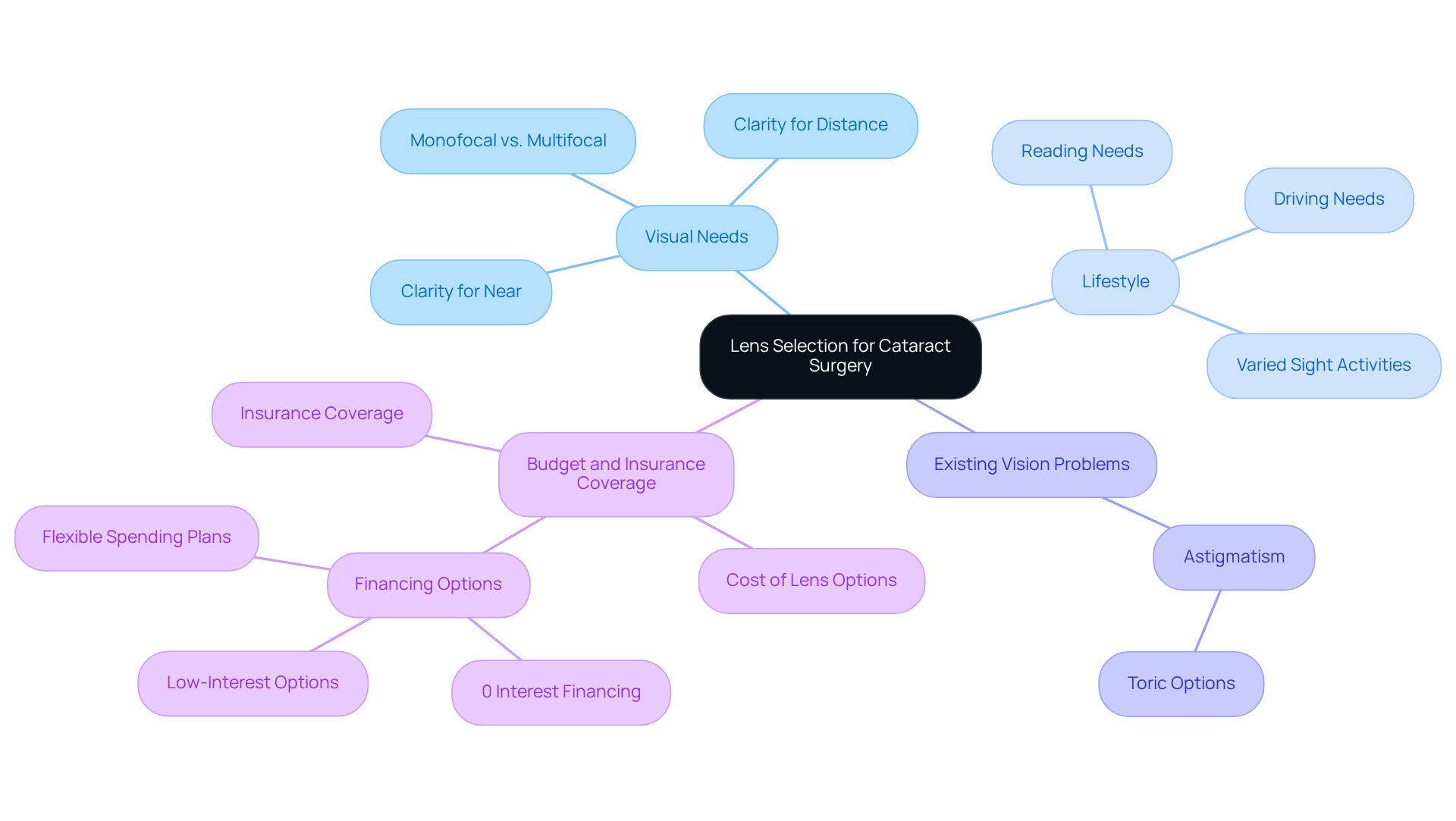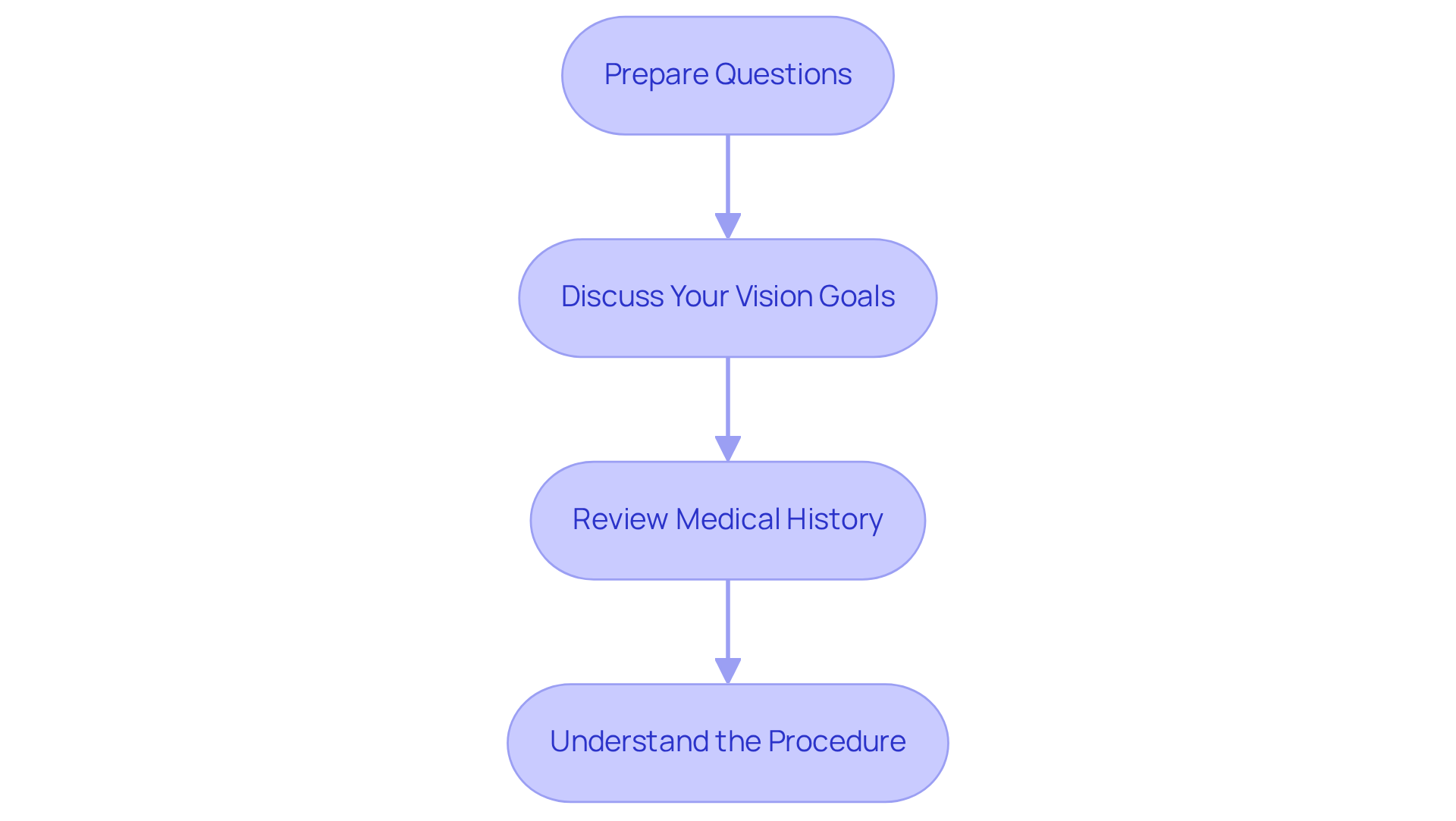Posted by: Northwest Eye in Cataracts on August 23, 2025
Overview
Cataract surgery lens options include:
- Monofocal
- Multifocal
- Toric
- Light adjustable lenses
Each designed to meet different visual needs and lifestyles. We understand that choosing the right lens can feel overwhelming, but it’s important to know that each type offers unique features and benefits. When making your choice, consider your visual requirements, lifestyle, existing vision problems, and budget. This thoughtful approach can help you find the best solution for your individual situation.
Introduction
Selecting the right lens for cataract surgery can feel overwhelming, much like navigating a complex maze. With so many options available today, it’s natural to have questions and concerns. Each lens type—from monofocal to multifocal, and even the innovative light adjustable lenses—offers distinct advantages tailored to different vision needs.
We understand that determining which option aligns best with your lifestyle and visual requirements can be challenging. This guide delves into the essential factors to consider, empowering you to make informed choices that lead to clearer vision and an enhanced quality of life.
Understand Cataract Surgery Lens Types
Cataract surgery is a significant step towards clearer vision, involving the replacement of the clouded natural optical component of the eye with an artificial intraocular implant (IOL). We understand that navigating your options can feel overwhelming, so let’s explore the main types of lenses available to you:
- Monofocal Lenses: These lenses provide clear vision at one distance, typically set for either near or far vision. It’s common for patients to still require glasses for other distances.
- Multifocal Optics: Crafted as one of the cataract surgery lens options, these optics deliver sharp sight at various distances and can reduce the need for glasses for both close and distant activities, allowing for a more versatile vision experience.
- Toric Optics: Specifically designed to correct astigmatism, toric optics are one of the cataract surgery lens options that feature different powers in different meridians of the optical element, catering to your unique vision needs.
- Cataract surgery lens options include Light Adjustable Lenses (LAL), which provide the ability for post-operative modifications to enhance your sight based on your specific requirements. This innovative option allows for personalized correction after surgery, enabling fine-tuning of your prescription to achieve the best possible result. LAL can adjust for nearsightedness (myopia), farsightedness (hyperopia), or both, offering a highly tailored method for sight correction.
At Northwest Eye, we are here to help you through the selection process for your eyewear. Our dedicated surgeons and technicians are committed to supporting you every step of the way. We utilize advanced diagnostic technology and conduct thorough pre-operative measurements to ensure the best fit for your lifestyle.
We also provide a range of optical packages, such as the single distance astigmatism option and blended vision option, to address your specific vision requirements. Understanding the cataract surgery lens options is crucial, as it empowers you to discuss your preferences and needs with your eye care provider effectively. Remember, we are here to support you on this journey towards better vision.

Explore Lens Options: Features and Benefits
Each lens type offers unique features and benefits that cater to your individual needs:
-
Monofocal Lenses:
- Features: A simple design that focuses on one distance.
- Benefits: Reliable and cost-effective, these lenses are ideal for those who primarily need distance vision.
-
Multifocal Lenses:
- Features: Designed with multiple zones for different distances.
- Benefits: They reduce your dependency on glasses for various activities, enhancing your quality of life.
-
Toric Lenses:
- Features: Specifically curved to correct astigmatism.
- Benefits: These lenses offer improved clarity for patients with astigmatism, decreasing the necessity for glasses.
-
Light Adjustable Lenses:
- Features: Adjustable post-surgery using UV light.
- Benefits: They provide customized eye correction, enabling adjustments based on your feedback following surgery.
We understand that selecting the appropriate cataract surgery lens options can feel overwhelming. Understanding these characteristics and advantages is crucial for making an informed decision regarding cataract surgery lens options that meet your personal requirements. Remember, we are here to help you through this process.

Consider Key Factors for Lens Selection
When selecting a lens for cataract surgery, it’s important to consider a few key factors that reflect your unique needs and concerns:
- Visual Needs: We understand that clear vision is essential for your daily life. Think about whether you need clarity for distance, near, or both. This will help you decide which of the cataract surgery lens options, a monofocal or multifocal optical component, is more appropriate for you.
- Lifestyle: It’s common to have diverse activities in your day-to-day life. If you enjoy reading, driving, or other activities that require varied sight, you may find that cataract surgery lens options like multifocal or light adjustable optics are beneficial for you.
- Existing Vision Problems: If you have astigmatism, you might need toric options to help correct this issue.
- Budget and Insurance Coverage: Understanding the costs associated with cataract surgery lens options and what your insurance covers is crucial. Premium optics may involve higher out-of-pocket expenses. At Northwest Eye, we offer financing options for qualified candidates, including 0% interest financing for up to 24 months through CareCredit® and low-interest options for up to 60 months, with payments as low as $100 per month. Additionally, flexible spending plans can help further with costs.
Taking these factors into account will empower you to make a choice that best fits your lifestyle and visual requirements. Remember, we are here to help you through this process.

Consult with Your Eye Care Provider for Personalized Guidance
After understanding your optical choices and considering your individual factors, the next step is to consult with your eye care provider. We understand that this can feel overwhelming, but preparing for this consultation can help you feel more at ease. Here’s how to get ready:
- Prepare Questions: Write down any questions or concerns you have about the surgery and lens options, including inquiries about the Light Adjustable Lens (LAL) technology. This innovative option allows for adjustments post-surgery, ensuring personalized vision correction.
- Discuss Your Vision Goals: Clearly communicate your visual needs and lifestyle to your provider. This will help them suggest the most appropriate type of optical device, including the option to personalize your vision with the LAL.
- Review Medical History: Be open about your medical history and any existing eye conditions. We understand that sharing this information can feel daunting, but it’s essential as these factors can influence your eyewear choices.
- Understand the Procedure: Don’t hesitate to ask your provider to explain the surgical process, recovery expectations, and any potential risks associated with the cataract surgery lens options, particularly regarding the advanced technology of the LAL.
Engaging in this dialogue will empower you to make an informed decision. Remember, we are here to support you in ensuring that your cataract surgery aligns with your vision goals, especially with the personalized care options available at Northwest Eye.

Conclusion
Choosing the right lens for cataract surgery is a pivotal decision that can significantly enhance your quality of life through improved vision. We understand that with various options available—including monofocal, multifocal, toric, and light adjustable lenses—it can feel overwhelming. Understanding the unique features and benefits of each type is essential for making an informed choice that aligns with your visual needs and lifestyle preferences.
As you navigate this decision-making process, consider your specific visual requirements, daily activities, existing vision issues, and budget constraints. It’s common to feel uncertain, but engaging with your eye care provider is crucial. They can offer personalized guidance tailored to your needs, ensuring that the selected lens optimally supports your vision goals.
Ultimately, taking the time to explore cataract surgery lens options and consulting with a knowledgeable professional can lead to a more satisfying outcome. Empowerment through education and dialogue with your eye care provider not only aids in selecting the ideal lens but also enhances the overall success of your cataract surgery experience. We are here to help you through this process. Prioritize your vision and well-being by making informed choices that will pave the way for clearer sight and an improved quality of life.
Frequently Asked Questions
What is cataract surgery?
Cataract surgery involves replacing the clouded natural lens of the eye with an artificial intraocular implant (IOL) to improve vision clarity.
What are the main types of lenses available for cataract surgery?
The main types of lenses include Monofocal Lenses, Multifocal Optics, Toric Optics, and Light Adjustable Lenses (LAL).
What are Monofocal Lenses?
Monofocal Lenses provide clear vision at one distance, typically set for either near or far vision, but patients may still need glasses for other distances.
What are Multifocal Optics?
Multifocal Optics allow for sharp sight at various distances, reducing the need for glasses for both close and distant activities.
What are Toric Optics?
Toric Optics are designed specifically to correct astigmatism and feature different powers in different meridians of the lens to cater to individual vision needs.
What are Light Adjustable Lenses (LAL)?
Light Adjustable Lenses provide the ability for post-operative modifications to enhance sight based on specific requirements, allowing for personalized correction after surgery.
How do Light Adjustable Lenses work?
LAL can adjust for nearsightedness (myopia), farsightedness (hyperopia), or both, offering a tailored method for sight correction.
What support does Northwest Eye provide for lens selection?
Northwest Eye offers dedicated support from surgeons and technicians, advanced diagnostic technology, thorough pre-operative measurements, and a range of optical packages to meet specific vision requirements.






